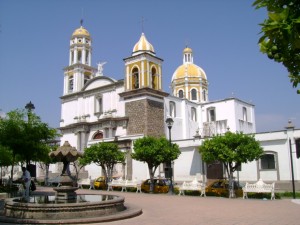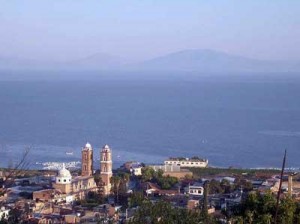 Comala is a small town in the state of Colima, its name comes from the Nahuatl “comalli” which means “place of comal”, (Comal is a type of traditional cookware used mostly to make or to warm tortillas); this destination is also known as “America’s white town” thanks to the fact that most of its white facades are highlighted by its red roofs. This town is famous for the excellent weather, its streets, its cuisine and the people who jealously keeps their traditions. In 1988 it was declared an Area of Historic Monuments and in 2002 was elected to the national program “Magic Towns of Mexico”. It is one of the most famous places of Colima by the legend, folklore and traditions that are mentioned in the novel Pedro Paramo, from the renowned writer Juan Rulfo, borned in Jalisco. The oldest inhabitants of the territory of Comala settled there 3,000 years ago some of the major cultures were the Olmec, Nahuatl, Toltec, Chichimecan and finally the Tarascan at the arrival of the Spanish troops. Many indigenous are still settling in Suchitlan, a town next to Comala. more…
Comala is a small town in the state of Colima, its name comes from the Nahuatl “comalli” which means “place of comal”, (Comal is a type of traditional cookware used mostly to make or to warm tortillas); this destination is also known as “America’s white town” thanks to the fact that most of its white facades are highlighted by its red roofs. This town is famous for the excellent weather, its streets, its cuisine and the people who jealously keeps their traditions. In 1988 it was declared an Area of Historic Monuments and in 2002 was elected to the national program “Magic Towns of Mexico”. It is one of the most famous places of Colima by the legend, folklore and traditions that are mentioned in the novel Pedro Paramo, from the renowned writer Juan Rulfo, borned in Jalisco. The oldest inhabitants of the territory of Comala settled there 3,000 years ago some of the major cultures were the Olmec, Nahuatl, Toltec, Chichimecan and finally the Tarascan at the arrival of the Spanish troops. Many indigenous are still settling in Suchitlan, a town next to Comala. more…
Archive for February, 2011
 Chapala is the largest of the six Lakeside communities. The region where Lake Chapala is located was called Chimaloacán: “place for the people using shield”. In the ninth century a big migration of Nahuatl origin tribes, from the northwest of the country, gave rise to the major settlements of the central plateau of Mexico; the residents of Chapala belonged to the group of Tanalan from where a warlord named Chapa encouraged groups to form a new population on the shores of the lake. Thus was formed Chapatla or Chapatlán. The word Chapala comes from the Nahuatl and means “place of Grasshoppers on the water”. Due to the characteristics of the area, the main activities were fishing, hunting, trade and agriculture. Over the entire basin was established the first pre-Hispanic communications between Tenochtitlan and northern and western regions. Later this long basin favored the Spanish exploration and conquest. more…
Chapala is the largest of the six Lakeside communities. The region where Lake Chapala is located was called Chimaloacán: “place for the people using shield”. In the ninth century a big migration of Nahuatl origin tribes, from the northwest of the country, gave rise to the major settlements of the central plateau of Mexico; the residents of Chapala belonged to the group of Tanalan from where a warlord named Chapa encouraged groups to form a new population on the shores of the lake. Thus was formed Chapatla or Chapatlán. The word Chapala comes from the Nahuatl and means “place of Grasshoppers on the water”. Due to the characteristics of the area, the main activities were fishing, hunting, trade and agriculture. Over the entire basin was established the first pre-Hispanic communications between Tenochtitlan and northern and western regions. Later this long basin favored the Spanish exploration and conquest. more…
